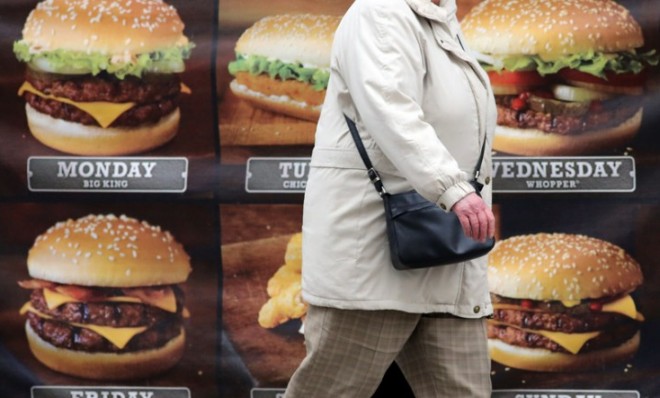Should the U.S. adopt a fat tax?
You might not buy that value pack of Twinkies if it cost 25 percent more

Two-thirds of American adults are overweight or obese, and the Centers for Disease Control predict that nearly half will be obese by 2030. Obesity rates in children have more than tripled in the past three decades, to the point where the arteries of a typical obese child are as thick and stiff as that of a healthy 45-year-old. This puts kids at a premature risk for strokes, heart disease, and diabetes — which already place a $190 billion strain on health-care spending.
Of course, it's no secret that Americans are addicted to junk food. And according to Michael Moss, author of the recent New York Times Magazine cover story "The Extraordinary Science of Addictive Junk Food," this addiction will only deepen as the food industry continues to find new ways to "get people hooked on foods that are convenient and inexpensive."
Diet is hardly the only factor behind America's obesity epidemic. Still, eating a healthier diet rich in fruits and vegetables is one of the most effective ways to prevent unnecessary weight gain.
The Week
Escape your echo chamber. Get the facts behind the news, plus analysis from multiple perspectives.

Sign up for The Week's Free Newsletters
From our morning news briefing to a weekly Good News Newsletter, get the best of The Week delivered directly to your inbox.
From our morning news briefing to a weekly Good News Newsletter, get the best of The Week delivered directly to your inbox.
But how do make people eat healthier? Maybe by levying a "fat tax" on unhealthy foods and beverages.
"Economists generally agree that government intervention, including taxation, is justified when the market fails to provide the optimum amount of a good for society's well-being," says Oliver Mytton, co-author of a recent report in the British Medical Journal that reviewed nearly 30 international studies to determine the effect that food taxes have on populations.
The report found that in the U.S., a 20 percent tax on sugary beverages would reduce obesity levels by 3.5 percent — from 33.5 percent to 30 percent among adults. It's a simple idea: If things are expensive enough, the cost becomes prohibitive enough that some people won't buy them. Similar findings published in Archives of Internal Medicine estimate that an 18 percent tax on pizza and soda would cause the average American to lose 5 pounds per year. "Our findings suggest that national, state, or local policies to alter the price of less healthful foods and beverages may be one possible mechanism for steering U.S. adults toward a more healthful diet," the researchers conclude.
Many food tax advocates also point to the success of other government-mandated measures to improve public health. New York's trans fat ban, for instance, helped decreased the number of restaurants cooking with trans fat from 50 percent to less than 2 percent.
A free daily email with the biggest news stories of the day – and the best features from TheWeek.com
The cigarette tax could serve as a model for a tax on obesity-causing foods. Following the implementation of a steep cigarette tax in the late 1990s (effectively raising the cost of cigarettes by 50 percent), smoking rates plummeted sharply. Today, less than 20 percent of Americans are smokers — a stark departure from smoking's peak in the 1960s, when 42 percent of Americans smoked regularly. Of course, there are loads of factors that contributed to that decline — but the cigarette tax is surely one of them.
Now, not everyone is sold on a fat tax. Critics argue that it's an overreach of government power. "I don't think government should be picking winners and losers with respect to people's diets," said Nevada GOP lawmaker Pat Hickey, in response to a recent proposal for an additional tax on fast food.
Warren Hardy, a lobbyist for the Nevada Restaurant Association, argues that his state's proposed tax — and fat taxes in general — are "the very definition" of a regressive tax that will place a disproportionate burden on the poor.
Research published by the Forum for Health Economics & Policy supports this claim. The report, which measures the impact a 10 percent fat tax would have on families of varying income levels, concludes that "almost the entire burden of the fat tax falls on poor families. The regulatory burden for the average family declines rapidly with income. ...[T]hus the burden at $20,000 is nearly 10 times larger than that at $100,000."
Opponents also point out that a fat tax in Denmark on foods with a saturated fat content above 2.3 percent — implemented in 2011 and then repealed just one year later — failed to change consumers' buying habits. Many Danes opposing the new tax simply stocked up on goods before the law went into effect, or hopped the border to either Germany of Sweden, where they paid as much as 20 percent less for the same items. The tax also cost the country an estimated 1,300 jobs, mainly due to a trimming of workers in food retail sectors.
To really nuke the problem, you need big guns — bigger than most politicians are willing to back. Most studies agree it would take a tax increase of at least 20 percent to meaningfully change consumers' buying behavior — a steeper rate than even the most ardent proponents of the fat tax are proposing.
So instead of implementing tax increases at a time when food prices are already on the rise (and when new taxes are sure to prove unpopular and politically impossible), many public health advocates argue that the real way to wean Americans off of junk food is to change how the U.S. government awards its agricultural subsidies.
According to the Physicians Committee for Responsible Medicine, 87 percent of federal tax subsidies go toward meat, dairy, corn and other grains — a large portion of which are used to make junk food — while less than 1 percent goes towards fruits and vegetables.
These subsidies, writes Michael Pollan in an op-ed for the New York Times, are how the U.S. has made "Twinkies cheaper than carrots and Coca-Cola competitive with water."
Putting a larger portion of agricultural subsidies toward fruits and vegetables could have a profound effect in reducing obesity, says Richard Atkinson, founder of the American Obesity Association. "There are a lot of subsidies for the two things we should be limiting in our diet, which are sugar and fat, and there are not a lot of subsidies for broccoli and Brussel sprouts […] If we're trying to look for something political that might make a difference, try subsidizing fruit and vegetable growers so the cost is comparatively lower for better foods."
Jen Kalaidis is a communications professional and freelance writer. She lives in New York City.
-
 Exploring ancient forests on three continents
Exploring ancient forests on three continentsThe Week Recommends Reconnecting with historic nature across the world
-
 How oil tankers have been weaponised
How oil tankers have been weaponisedThe Explainer The seizure of a Russian tanker in the Atlantic last week has drawn attention to the country’s clandestine shipping network
-
 The rise of the spymaster: a ‘tectonic shift’ in Ukraine’s politics
The rise of the spymaster: a ‘tectonic shift’ in Ukraine’s politicsIn the Spotlight President Zelenskyy’s new chief of staff, former head of military intelligence Kyrylo Budanov, is widely viewed as a potential successor